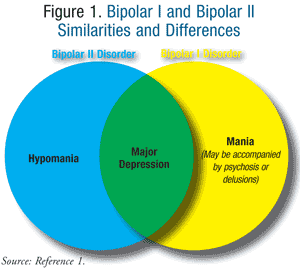
How to diagnose bipolar type II disorder? Is bipolar II easier to live with than bipolar I? What is bipolar Level 2? Plus, symptoms, treatments, and how bipolar II is different from other types of bipolar disorder. Diagnosis for bipolar II disorder requires that the individual must never have experienced a full manic episode. Bipolar disorder type II has a slightly greater prevalence. A person with bipolar will experience a full manic episode, while a. A look at the different types of bipolar disorder, including bipolar I, bipolar II , cyclothymic disorder, mixed bipolar , and rapid cycling.

Since the “highs” are not a full manic episode it is also referred to as “soft bipolar”, though this term is a little misleading. Bipolar II Disorder might be more common than you realize. While the manic episodes of bipolar I disorder can be severe and dangerous, individuals with bipolar II disorder can be depressed for longer periods, which can cause significant impairment. All forms of bipolar disorder cause unusual mood shifts and changes in energy and activity levels.
Though it’s normal to experience depression or sadness from time to time as well as occasional moods characterized by excessive energy and intense focus, for the bipolar II disorder patient these episodic moods are extreme in nature and occur in a constant, uncontrollable pattern. These are the differences between bipolar I and bipolar II disorders. Read about symptoms, diagnosis, and more.
You may be told you have bipolar I if you have experienced at least one episode of mania which has lasted longer than a week. You might also have experienced depressive episodes, although not everyone does. You may get a diagnosis of bipolar II if you have experienced both at least one episode of severe depression and symptoms of. DSM-IV criteria for BP II require the presence or history of one or more major depressive episode, plus at least one hypomanic episode, which, by definition, must last for at least days.
There are only a few treatment guidelines aimed at this type of bipolar disorder. Most guidelines suggest using the same medications as for bipolar I disorder. The pronunciation of this disorder is “ bipolar type 2” or “ type bipolar ”. To diagnose bipolar there must be at least one episode each of hypomania and major depression.
One key feature of bipolar II disorder is the patient should never have had a manic episode. The cause of bipolar disorders (BPD) overlaps with major unipolar depression (UPD). A person may have bipolar disorder even if their symptoms are less extreme.
During a hypomanic episode, a person may feel very goo be able to get things done, and keep up with day-to-day life. Bipolar Type I is often treated with different medications than those for Bipolar Type II , so testing to pinpoint your precise condition is very important. A Bipolar Test is especially important if you suffer from depression, but experience hypomania rather than full blown bipolar mania. Instea we struggle with Hypomania, which is a. I was fiery and ferocious, capable of lighting up a room or just as easily burning it down.
Bipolar Disorder Type I and Bipolar Disorder Type II Similarities. Frances A(1), Jones KD. The space between the upward curve is the spectrum and each person with bipolar II disorder exists somewhere along it.
The closer a person’s symptoms are to one en the more likely that person is to receive a diagnosis of major depression or manic depression. With bipolar I, the mania is usually quite clear. In bipolar II , the mania is milder. I’ve clustered their responses about antidepressants into categories: Antidepressants are helpful in bipolar II and do not cause hypomania (endorsed by out of experts). ICD-10-CM code that can be used to indicate a diagnosis for.
However, in bipolar II disorder, the up moods never reach full-on mania. The less-intense elevated moods in bipolar II disorder are called hypomanic episodes, or hypomania. Hypomania actually has the same basic criteria as bipolar mania but it is less severe.
No comments:
Post a Comment
Note: Only a member of this blog may post a comment.